不定代词
- 格式:ppt
- 大小:1.58 MB
- 文档页数:20
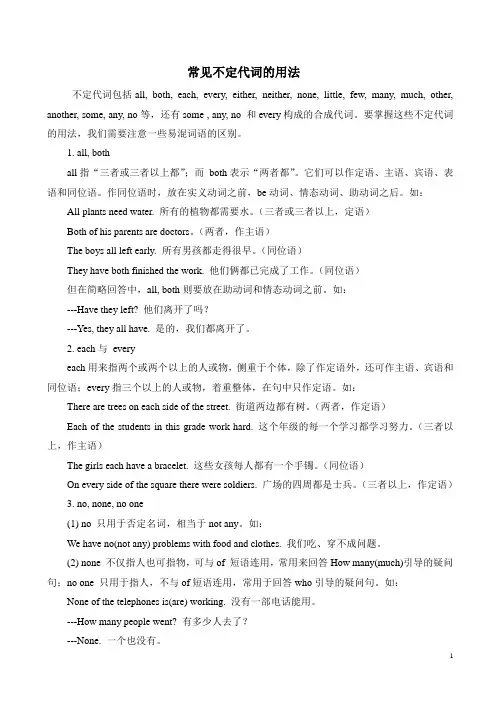
常见不定代词的用法不定代词包括all, both, each, every, either, neither, none, little, few, many, much, other, another, some, any, no等,还有some , any, no 和every构成的合成代词。
要掌握这些不定代词的用法,我们需要注意一些易混词语的区别。
1. all, bothall指“三者或三者以上都”;而both表示“两者都”。
它们可以作定语、主语、宾语、表语和同位语。
作同位语时,放在实义动词之前,be动词、情态动词、助动词之后。
如:All plants need water. 所有的植物都需要水。
(三者或三者以上,定语)Both of his parents are doctors。
(两者,作主语)The boys all left early. 所有男孩都走得很早。
(同位语)They have both finished the work. 他们俩都已完成了工作。
(同位语)但在简略回答中,all, both则要放在助动词和情态动词之前。
如:---Have they left? 他们离开了吗?---Yes, they all have. 是的,我们都离开了。
2. each与everyeach用来指两个或两个以上的人或物,侧重于个体,除了作定语外,还可作主语、宾语和同位语;every指三个以上的人或物,着重整体,在句中只作定语。
如:There are trees on each side of the street. 街道两边都有树。
(两者,作定语)Each of the students in this grade work hard. 这个年级的每一个学习都学习努力。
(三者以上,作主语)The girls each have a bracelet. 这些女孩每人都有一个手镯。
(同位语)On every side of the square there were soldiers. 广场的四周都是士兵。
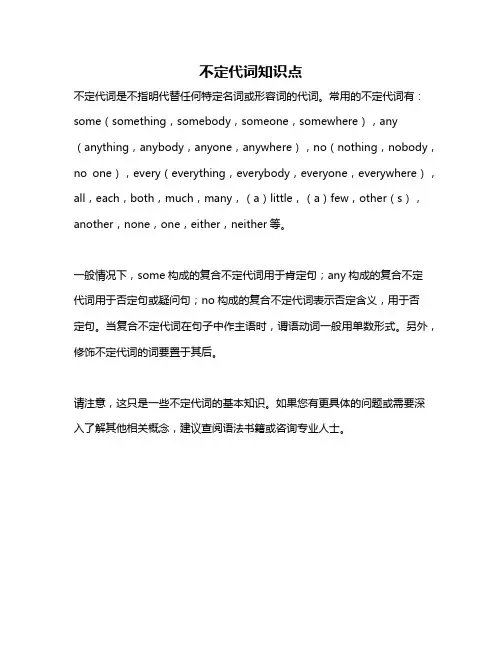
不定代词知识点
不定代词是不指明代替任何特定名词或形容词的代词。
常用的不定代词有:some(something,somebody,someone,somewhere),any (anything,anybody,anyone,anywhere),no(nothing,nobody,no one),every(everything,everybody,everyone,everywhere),all,each,both,much,many,(a)little,(a)few,other(s),another,none,one,either,neither等。
一般情况下,some构成的复合不定代词用于肯定句;any构成的复合不定代词用于否定句或疑问句;no构成的复合不定代词表示否定含义,用于否
定句。
当复合不定代词在句子中作主语时,谓语动词一般用单数形式。
另外,修饰不定代词的词要置于其后。
请注意,这只是一些不定代词的基本知识。
如果您有更具体的问题或需要深入了解其他相关概念,建议查阅语法书籍或咨询专业人士。
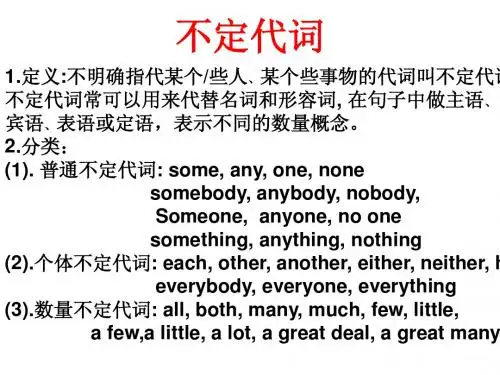
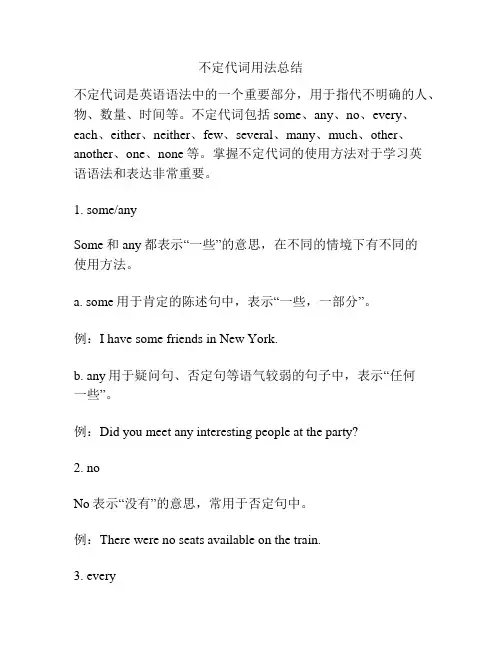
不定代词用法总结不定代词是英语语法中的一个重要部分,用于指代不明确的人、物、数量、时间等。
不定代词包括some、any、no、every、each、either、neither、few、several、many、much、other、another、one、none等。
掌握不定代词的使用方法对于学习英语语法和表达非常重要。
1. some/anySome和any都表示“一些”的意思,在不同的情境下有不同的使用方法。
a. some用于肯定的陈述句中,表示“一些,一部分”。
例:I have some friends in New York.b. any用于疑问句、否定句等语气较弱的句子中,表示“任何一些”。
例:Did you meet any interesting people at the party?2. noNo表示“没有”的意思,常用于否定句中。
例:There were no seats available on the train.3. everyEvery表示“每一个”的意思。
例:Every student is required to attend the meeting.4. eachEach表示“每一个”,用于强调个体。
例:Each student is responsible for his or her own progress.5. either/neitherEither表示“两者中的任何一个”,neither表示“两者都不”。
例:You can choose either the blue or the red dress.例:Neither of us likes to cook.6. few/several/many/much这些代词都用于表示数量或程度。
a. few表示“很少,几乎没有”。
例:There were few people in the park on such a hot day.b. several表示“几个,若干”。
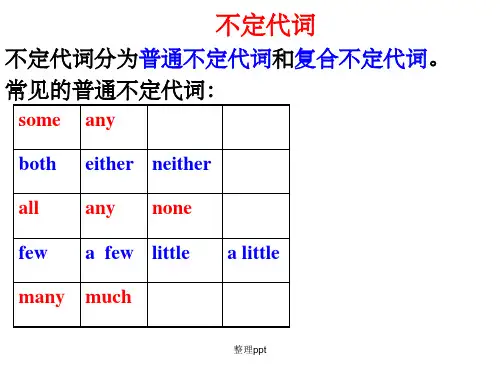
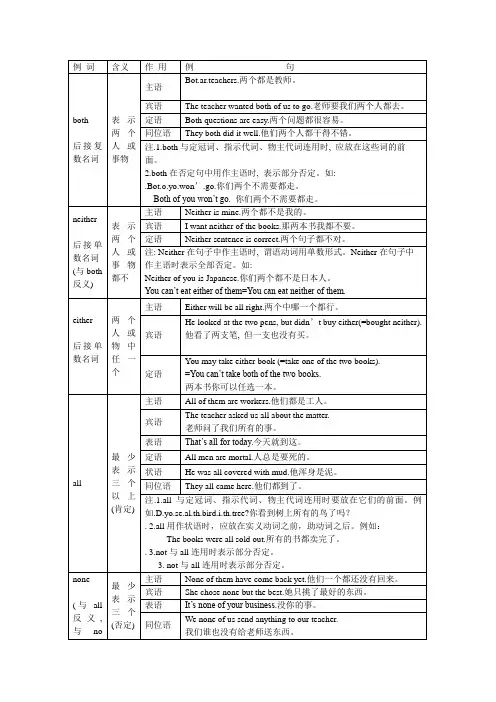
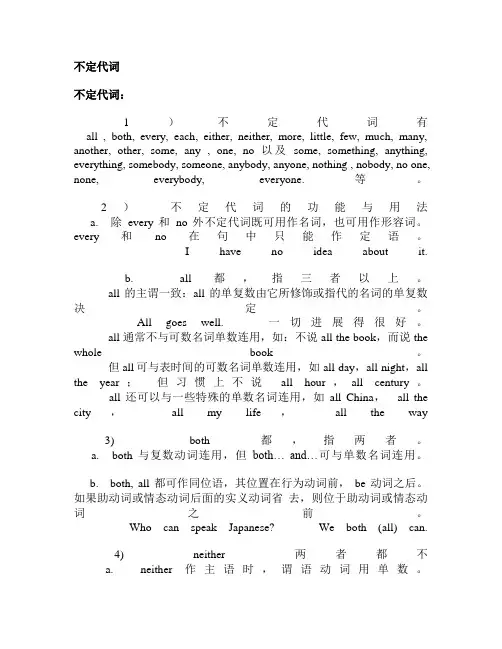
不定代词不定代词:1)不定代词有all , both, every, each, either, neither, more, little, few, much, many, another, other, some, any , one, no 以及some, something, anything, everything, somebody, someone, anybody, anyone, nothing , nobody, no one, none, everybody, everyone.等。
2)不定代词的功能与用法a.除every 和no外不定代词既可用作名词,也可用作形容词。
every和no在句中只能作定语。
I have no idea about it.b.all 都,指三者以上。
all 的主谓一致:all的单复数由它所修饰或指代的名词的单复数决定。
All goes well.一切进展得很好。
all 通常不与可数名词单数连用,如:不说 all the book,而说 the whole book。
但all可与表时间的可数名词单数连用,如 all day,all night,all the year;但习惯上不说all hour,all century。
all还可以与一些特殊的单数名词连用,如all China,all the city,all my life,all the way3)both都,指两者。
a.both 与复数动词连用,但both… and…可与单数名词连用。
b.both, all 都可作同位语,其位置在行为动词前,be 动词之后。
如果助动词或情态动词后面的实义动词省去,则位于助动词或情态动词之前。
Who can speak Japanese?We both (all) can.4)neither两者都不a.neither作主语时,谓语动词用单数。
b. 作定语与单数名词连用,但neither… nor 用作并列连词,可与复数名词连用。
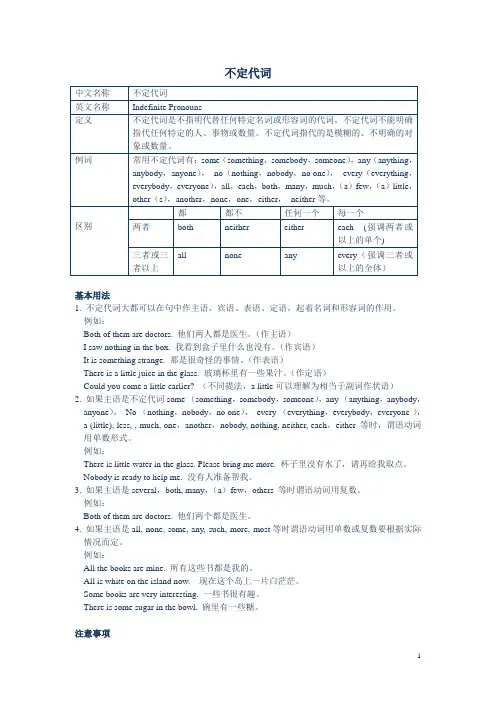
不定代词基本用法1. 不定代词大都可以在句中作主语、宾语、表语、定语,起着名词和形容词的作用。
例如:Both of them are doctors. 他们两人都是医生。
(作主语)I saw nothing in the box. 我看到盒子里什么也没有。
(作宾语)It is something strange. 那是很奇怪的事情。
(作表语)There is a little juice in the glass. 玻璃杯里有一些果汁。
(作定语)Could you come a little earlier? (不同提法,a little可以理解为相当于副词作状语)2. 如果主语是不定代词some-(something,somebody,someone),any-(anything,anybody,anyone),No-(nothing,nobody,no one),every-(everything,everybody,everyone-),a (little), less, , much, one,another,nobody, nothing, neither, each,either 等时,谓语动词用单数形式。
例如:There is little water in the glass. Please bring me more. 杯子里没有水了,请再给我取点。
Nobody is ready to help me. 没有人准备帮我。
3. 如果主语是several,both, many,(a)few,others 等时谓语动词用复数。
例如:Both of them are doctors. 他们两个都是医生。
4. 如果主语是all, none, some, any, such, more, most等时谓语动词用单数或复数要根据实际情况而定。
例如:All the books are mine. 所有这些书都是我的。
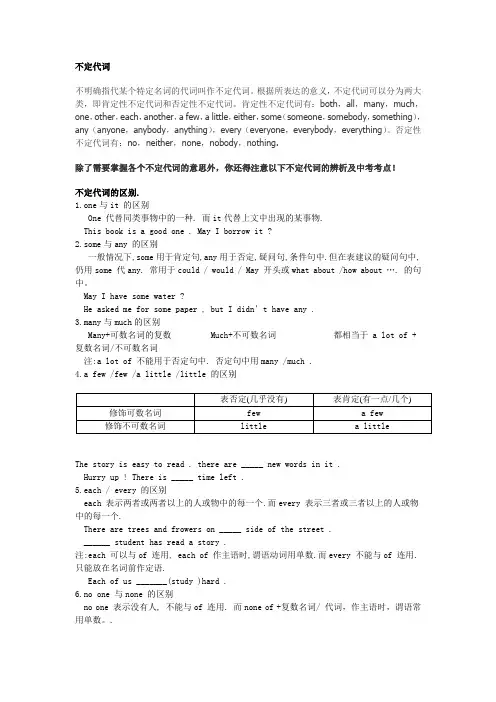
不定代词不明确指代某个特定名词的代词叫作不定代词。
根据所表达的意义,不定代词可以分为两大类,即肯定性不定代词和否定性不定代词。
肯定性不定代词有:both,all,many,much,one,other,each,another,a few,a little,either,some(someone,somebody,something),any(anyone,anybody,anything),every(everyone,everybody,everything)。
否定性不定代词有:no,neither,none,nobody,nothing.除了需要掌握各个不定代词的意思外,你还得注意以下不定代词的辨析及中考考点!不定代词的区别.1.one与it 的区别One 代替同类事物中的一种. 而it代替上文中出现的某事物.This book is a good one . May I borrow it ?2.some与any 的区别一般情况下,some用于肯定句,any用于否定,疑问句,条件句中.但在表建议的疑问句中,仍用some 代any. 常用于could / would / May 开头或what about /how about …. 的句中。
May I have some water ?He asked me for some paper , but I didn’t have any .3.many与much的区别Many+可数名词的复数 Much+不可数名词都相当于 a lot of +复数名词/不可数名词注:a lot of 不能用于否定句中. 否定句中用many /much .4.a few /few /a little /little 的区别The story is easy to read . there are _____ new words in it .Hurry up ! There is _____ time left .5.each / every 的区别each 表示两者或两者以上的人或物中的每一个.而every 表示三者或三者以上的人或物中的每一个.There are trees and frowers on _____ side of the street .______ student has read a story .注:each 可以与of 连用, each of 作主语时,谓语动词用单数.而every 不能与of 连用.只能放在名词前作定语.Each of us _______(study )hard .6.no one 与none 的区别no one 表示没有人, 不能与of 连用. 而none of +复数名词/ 代词,作主语时,谓语常用单数。
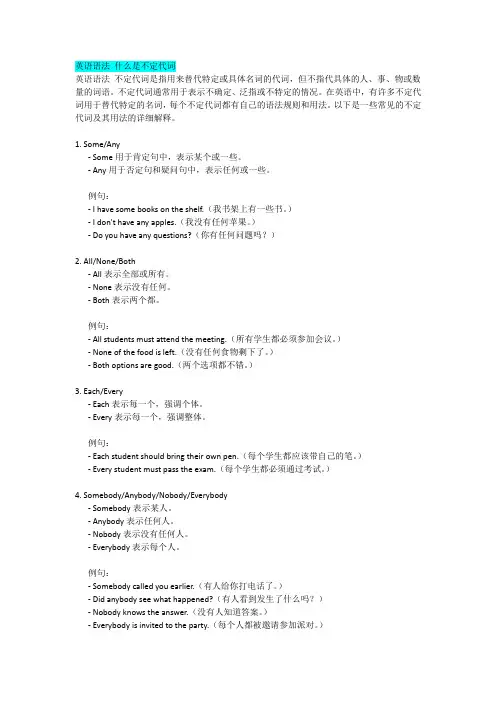
英语语法什么是不定代词英语语法不定代词是指用来替代特定或具体名词的代词,但不指代具体的人、事、物或数量的词语。
不定代词通常用于表示不确定、泛指或不特定的情况。
在英语中,有许多不定代词用于替代特定的名词,每个不定代词都有自己的语法规则和用法。
以下是一些常见的不定代词及其用法的详细解释。
1. Some/Any- Some用于肯定句中,表示某个或一些。
- Any用于否定句和疑问句中,表示任何或一些。
例句:- I have some books on the shelf.(我书架上有一些书。
)- I don't have any apples.(我没有任何苹果。
)- Do you have any questions?(你有任何问题吗?)2. All/None/Both- All表示全部或所有。
- None表示没有任何。
- Both表示两个都。
例句:- All students must attend the meeting.(所有学生都必须参加会议。
)- None of the food is left.(没有任何食物剩下了。
)- Both options are good.(两个选项都不错。
)3. Each/Every- Each表示每一个,强调个体。
- Every表示每一个,强调整体。
例句:- Each student should bring their own pen.(每个学生都应该带自己的笔。
)- Every student must pass the exam.(每个学生都必须通过考试。
)4. Somebody/Anybody/Nobody/Everybody- Somebody表示某人。
- Anybody表示任何人。
- Nobody表示没有任何人。
- Everybody表示每个人。
例句:- Somebody called you earlier.(有人给你打电话了。
)- Did anybody see what happened?(有人看到发生了什么吗?)- Nobody knows the answer.(没有人知道答案。
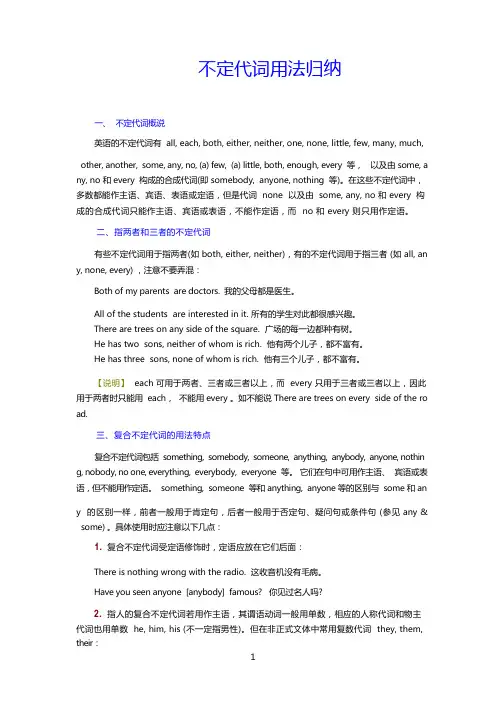
不定代词用法归纳一、不定代词概说英语的不定代词有 all, each, both, either, neither, one, none, little, few, many, much,other, another, some, any, no, (a) few, (a) little, both, enough, every 等,以及由 some, a ny, no 和 every 构成的合成代词(即 somebody, anyone, nothing 等)。
在这些不定代词中,多数都能作主语、宾语、表语或定语,但是代词 none 以及由 some, any, no 和 every 构成的合成代词只能作主语、宾语或表语,不能作定语,而 no 和 every 则只用作定语。
二、指两者和三者的不定代词有些不定代词用于指两者(如 both, either, neither),有的不定代词用于指三者 (如 all, an y, none, every) ,注意不要弄混:Both of my parents are doctors. 我的父母都是医生。
All of the students are interested in it. 所有的学生对此都很感兴趣。
There are trees on any side of the square. 广场的每一边都种有树。
He has two sons, neither of whom is rich. 他有两个儿子,都不富有。
He has three sons, none of whom is rich. 他有三个儿子,都不富有。
【说明】each 可用于两者、三者或三者以上,而 every 只用于三者或三者以上,因此用于两者时只能用 each,不能用 every 。
如不能说 There are trees on every side of the ro ad.三、复合不定代词的用法特点复合不定代词包括 something, somebody, someone, anything, anybody, anyone, nothin g, nobody, no one, everything, everybody, everyone 等。
不定代词一、定义:指代不确定的人或事物的代词叫不定代词。
英语中的不定代词常常成对出现,如some 和any, all 和both, neither 和either, each 和every, other 和another, much 和many, one 和no, none和no one, few 和a few,little 和a little,等等。
另外,还有由some, any, every, no 与body, one, thing 构成的复合不定代词:somebody, anybody, everybody, nobody, someone, anyone, everyone, no one, something, anything, everything, nothing。
some 和any都可修饰或指代可数名词和不可数名词;但some 一般用于肯定句,any一般用于疑问句和否定句和条件状语从句。
eg: I must get some fruit in the market.Do you have any books for children?If there is any thing difficult, please let me know.【考点】1. 当表示请求或要求并希望对方能给出肯定的回答时,some 也可用于疑问句;eg: Would you like some tea?Could you lend me some money?2. any 表示“任何的”之意时,也可用于肯定句。
eg: You can come here any time.Any student can answer this question.任何学生都可以回答这个问题。
Ex:1. Would you like ______ more?两者三者都both all都不neither none任何either any在···之间between among•both… and…两者都,作主语时,谓语动词用复数形式•all (of)指三者或三者以上的都•either…or指两个中的任意一个, 指“不是。
返回 | 分享 | 收藏不用冠词的情况1、国名,人名前通常不用冠词。
如:England英国 Mary玛丽2、名词前有this, that, my, your, whose, some, any, no, each, every等词时,不用冠词。
如:Thisis my hat. 这是我的帽子。
3、在表示交通工具、学科名称的名词前不加冠词。
如:by plane by boat onfootChinese4、在季节、月份、节日、假日、日期、星期等表示时间的名词之前,一般不用冠词。
如:Springis coming. 春天要来了。
Wego to school from Monday to Friday. 我们从星期一到星期五都上课。
5、在三餐、球类运动和娱乐运动的名称前,不加冠词。
如:have breakfast吃早饭 playchess玩象棋6、在一些固定词组中不加冠词。
冠词是一种虚词,不能独立使用,通常放在名词的前面,分为“不定冠词”和“定冠词”两种。
1、不定冠词:a、an。
用在单数名词前,表示“一个,一件……”。
an用在以元音“音素”开头的单词前。
如:an e-mail, an orange, anold man, an English watch, an hour…2、定冠词:the。
用在单数或者复数名词前。
the没有具体意思,有时翻译为这、那。
它的基本用法:(1)用来表示特指某(些)人或某(些)事物。
如:The map on the wall isnew.(2)表示说话者双方都知道的人或事物。
如:Look at the picture,please.(3)表示再次提到前面谈过的人或事物。
如:This is a stamp. The stampis beautif ul.(4)用在表示世界上独一无二的事物前。
如:the sun太阳the moon月亮the ear th地球(5)用在由普通名词构成的专有名词前。
不定代词的用法总结不定代词是指代词中的一类,它们可以用来代替不确定的人、物或概念。
不定代词在英语中有多种形式和用法,下面将总结这些用法,并对其作进一步的解释。
1. 代替不确定的人或物不定代词常被用来代替不确定的人或物。
它们包括somebody/anybody/nobody/everybody,something/anything/nothing/everything以及someone/anyone/no one/everyone等。
例如:- Can anybody help me with this problem? (有人能帮我解决这个问题吗?)- I don't want to buy anything. (我不想买任何东西。
)- Everybody is welcome to join the party. (欢迎每个人参加派对。
)2. 表示某种数量或程度不定代词也可以用来表示一定数量或程度,包括some/few/many/much/little/any/no等。
例如:- She has some money. (她有一些钱。
)- There are few people in the park. (公园里几乎没有人。
)- Do you have any questions? (你有什么问题吗?)3. 表示不完整的内容一些不定代词也可以用来表示不完整的内容,包括some/something/somebody/someone/any/anything/anybody/anyon e/nothing/nobody/no one等。
例如:- I have something to tell you. (我有件事要告诉你。
)- Is there anyone who can help me? (有人可以帮帮我吗?)- She knows nothing about it. (她对此一无所知。
代词:不定代词用法归纳不定代词是指用来代替特定人或事物的词语,它们的使用能够使语言更加简洁明了。
下面是一些常见的不定代词及其用法归纳:1.人称不定代词___:指某个人,表示不确定的人,相当于“某人”。
___:指某个人,表示不确定的人,相当于“某人”。
___:指某个人,表示不确定的人,相当于“某人”。
___:指某个人,表示不确定的人,相当于“某人”。
___:指某个人,表示不确定的人,相当于“某人”。
___:指某个人,表示不确定的人,相当于“某人”。
___:指某个人,表示不确定的人,相当于“某人”。
___:指某个人,表示不确定的人,相当于“某人”。
___:指某个人,表示不确定的人,相当于“某人”。
anyone / anybody:任何人,表示不限制特定的人,常用于疑问句、否定句和条件句中。
anyone / anybody:任何人,表示不限制特定的人,常用于疑问句、否定句和条件句中。
anyone / anybody:任何人,表示不限制特定的人,常用于疑问句、否定句和条件句中。
anyone / anybody:任何人,表示不限制特定的人,常用于疑问句、否定句和条件句中。
anyone / anybody:任何人,表示不限制特定的人,常用于疑问句、否定句和条件句中。
anyone / anybody:任何人,表示不限制特定的人,常用于疑问句、否定句和条件句中。
anyone / anybody:任何人,表示不限制特定的人,常用于疑问句、否定句和条件句中。
anyone / anybody:任何人,表示不限制特定的人,常用于疑问句、否定句和条件句中。
anyone / anybody:任何人,表示不限制特定的人,常用于疑问句、否定句和条件句中。
___:每个人,表示所有的人,常用于肯定句中。
___:每个人,表示所有的人,常用于肯定句中。
___:每个人,表示所有的人,常用于肯定句中。
___:每个人,表示所有的人,常用于肯定句中。
英语的不定代词有 all, each, both, either, neither, one, none, little, few, man y, much, other, another, some, any, no, (a) few, (a) little, both, enough, every 等,以及由 some, any, no 和 every 构成的合成代词(即 somebody, anyone, nothi ng 等)。
在这些不定代词中,多数都能作主语、宾语、表语或定语,但是代词 none 以及由 some, any, no 和 every 构成的合成代词只能作主语、宾语或表语,不能作定语,而no 和 every 则只用作定语。
有些不定代词用于指两者 (如 both, either, neither) ,有的不定代词用于指三者 (如 al l, any, none, every),注意不要弄混:Both of my parents are doctors. 我的父母都是医生。
All of the students are interested in it. 所有的学生对此都很感兴趣。
There are trees on each/every side of the square. 广场的每一边都种有树。
He has two sons, neither of whom is rich. 他有两个儿子,都不富有。
He has three sons, none of whom is rich. 他有三个儿子,都不富有。
each 可用于两者、三者或三者以上,而 every 只用于三者或三者以上,因此用于两者时只能用 each,不能用 every 。
如不能说 There are trees on every side of the road.复合不定代词包括 something, somebody, someone, anything, anybody, any one, nothing, nobody, no one, everything, everybody, everyone 等。
不定代词知识点总结不定代词是不指明代替任何特定名词或形容词的代词,在英语语法中有着重要的地位。
下面我们将对不定代词的主要知识点进行总结。
一、不定代词的种类不定代词主要包括 some,many,much,little,few,one,ones,no,neither,nor,each,every,all,both,neither…nor…,only 等。
这些词可以表示人、事物或抽象概念,是构成句子中不可缺少的一部分。
二、不定代词的用法1、替代词:不定代词可以替代名词或名词短语,避免重复。
例如:Can you pass me the book? (用 the book代替 the one I mentioned earlier)。
2、修饰词:不定代词可以用来修饰名词或名词短语,表示数量、程度、性质或特征。
例如:I have a few friends here. (表示数量);He is much taller than her. (表示程度);They are some good books. (表示性质)。
3、构成句子成分:不定代词在句子中可以作主语、宾语、表语或定语等。
例如:Each of us has a different opinion. (作主语);I will do what I can to help. (作宾语);This is none of your business. (作表语)。
三、不定代词的特殊用法1、both…and…:表示“两者都”,连接两个并列的主语时,谓语动词要用复数形式。
例如:Both she and I are students.2、neither…nor…:表示“既不……也不……”,连接两个并列的主语时,谓语动词要用单数形式。
例如:Neither he nor she likes music.3、other than:表示“除了”,相当于 but或 except。